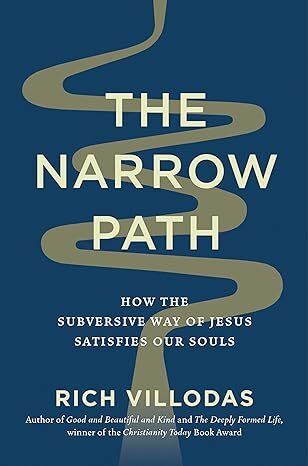The Subversive Way of Jesus: Finding the Good Life Where We Least Expect It
My good friend Rich Villodas captures the upside-down way of Jesus—the way of love—like few other writers I know. How often have we assumed that the “narrow path” Jesus offers us is restricting, when it is actually the only way to freedom? How easily do we expect that doing the “right” thing means we are following Jesus’s way, when it is only when our hearts are transformed that we can truly do good in this world? It’s a joy to welcome again the wise and thought-provoking Rich Villodas to the farm’s table today….
Guest Post by Rich Villodas
Have you ever been scuba diving? I haven’t. But—and I say this with more enthusiasm than I should—I have snorkeled a few times, thank you very much.
On an anniversary trip a few years ago, my wife and I looked up various excursions in Hawaii. I did extensive research, hoping to get in touch with the risk-taking part of my personality.
I watched a bunch of scuba videos on YouTube, finding inspiration and giving myself pep talks under my breath. This was short-lived when I found a simple chart outlining the differences between scuba diving and snorkeling.
I learned that scuba diving can cause something called nitrogen narcosis, which is essentially like being drunk underwater. Or your equipment can fail. While diving, you’re also at risk of pulmonary embolism. Yeah, no thanks.
So I decided to snorkel.
The snorkeling excursion went well. I saw a handful of fish at a safe distance and came up for a quick break when I swallowed a bit of water through my tube. I knew a beautiful world awaited me in the depths, but I chose life on the surface, where things felt safe and predictable.






I see a metaphor here for the spiritual life.
Many of us want to go deeper, but we find ourselves spiritually treading water on the surface. We try to live like Christian amphibians—half in, half out—but Jesus wants all of us, or, put differently, to give us all of himself.
He knows nothing of half-hearted discipleship.
“Many of us want to go deeper, but we find ourselves spiritually treading water on the surface.“
Jesus’s invitation is to follow him fully or not at all, using the metaphor of a road: “Enter through the narrow gate. For wide is the gate and broad is the road that leads to destruction, and many enter through it. But small is the gate and narrow the road that leads to life, and only a few find it” (Matthew 7:13–14).
When most people read Jesus’s words about the narrow and the broad paths, it’s through the lens of good morality versus bad morality, or perhaps the afterlife. The narrow path is the path “good” people take; the broad way is the preferred route of “bad” sinners. The narrow path is the avenue toward heaven, while the broad way is the road to hell.
But that outlook is not what Jesus has in mind. When Jesus offers two paths, he’s being clear, not cruel. He’s leading us to life—freeing us from the paralysis of decision fatigue. Because Jesus desires to form us today. He cares about who we are becoming, not just what we do. He rejects a spirituality that doesn’t transform our hearts. To adjust our behavior—even in positive directions—without interior examination will enslave us.
“The narrow path is the avenue toward heaven, while the broad way is the road to hell.”
The broad path is content with believing the “right” things and doing the “right” stuff, assuming that’s all Jesus wants. But a deeper look into our motivations is necessary for cultivating life with God. In other words, we can do all the right things but never examine why or how we should do them.
What is your vision of the good life?
What is your understanding of a good world?
If you’re not sure, look at how you spend your money and time. What are you perpetually chasing? What are your deepest desires and goals? Where does your ambition surface? These questions help show if you’re being formed into the image of Jesus or a copy of the fallen world around you.







Jesus invites you and me to reimagine what a good life truly is. Look at the lives transformed in the Gospels because of Jesus’s alternative road. Observe the freedom that came from his generous forgiveness.
“The narrow path is not about the number of people who will end up in heaven; it’s about the number of people who will allow themselves to be formed by the subversive and, ultimately, redemptive way of Jesus.“
Contemplate those who found solace in him—people who had spent their whole lives feeling spiritually and socially homeless. Picture the multitudes who were healed because of his compassion.
Redefining the good life may seem like a loss at first, but it ultimately yields the kind of significance you yearn for—a life found only on the radically narrow path of Jesus.
The narrow path is not about the number of people who will end up in heaven; it’s about the number of people who will allow themselves to be formed by the subversive and, ultimately, redemptive way of Jesus.
To the world, this path seems rigid, impractical, and uncomfortable (to be sure, it will be at times), but like a sea diver adjusting to the heavy pressure of an underwater existence, if we submit to the process, Jesus will show us a world of wonders we never thought possible!
We can stay on the surface, safe and dry, peering into the water, catching blurry glimpses of the beauty underneath . . . or we can dive in and immerse ourselves in a glorious realm.

Rich Villodas is the author of The Deeply Formed Life (a 2021 Christianity Today Book Award winner) and Good and Beautiful and Kind.
Since 2013, he’s been the lead pastor of New Life Fellowship, a large multiracial church with more than seventy-five countries represented, in Elmhurst, Queens, and Long Island, New York.
His latest book, The Narrow Path, invites us to experience the freedom of walking out Jesus’s subversive way of love.
{Our humble thanks to WaterBrook for their partnership in today’s devotional.}
Ann Voskamp's Blog
- Ann Voskamp's profile
- 1368 followers



